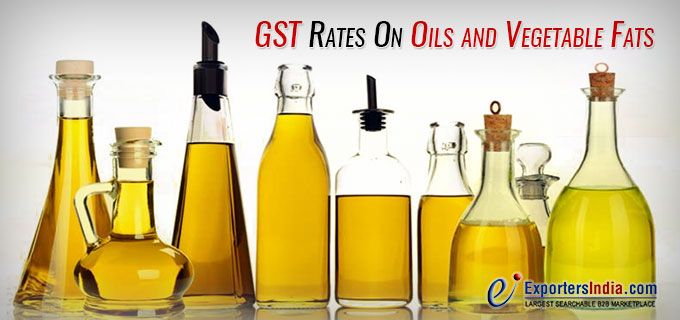GST Rates on Oils and Vegetable Fats
Since the revolutionary Goods and Services Tax implementation that took place in India on 1st July 2017, the common man has been worrying about the tax slab that various oils and fats have been put into. Initially, there were speculations that the oils and fats would not be kept under the GST ambit but after some pondering, the government decided to put the majority of oils in the 5% tax slab. However, the edible oils producers asked for an exemption from tax and said that edible oils should also be treated same as grains and pulses. They wanted the oils to be put in the nil rates but the GST on most of the oils has been kept at 5%. Here is a list of all the oils and the tax that would be applicable as per the new GST rule. 1. Vegetable Oils: The vegetable oils and fats with the HSN code 1507 and 1516 fall under the 5% tax slab. These include all types of vegetable oils that are not chemically modified but can be refined or otherwise. The main criteria for categorizing oils under the 5% slab is their chemical modification, if the oil is not chemically modified, it would have to bear a 5% GST.
2. Fractions Of Vegetable Oils: Fractions of vegetable oils that are chemically modified are kept under the 12% tax slab by the government. All the vegetable oils that are dehydrated, boiled, oxidized, blown, sulfurized, polymerized by heat in vacuum or in inert gas fall under this category. All the fractions of vegetable oils excluding those which fall under the HSN 1516 category fall under the 12% GST slab on oils.
3. Soya-Bean Oil And Its Fractions: All types of soya-bean oils that are included in the HSN 1507 category have been kept under the 5% tax slab. The soya-bean oils and its fractions that may or may not be refined but have not undergone any type of chemical modification fall under this category.
4. Vegetable Waxes: All types of vegetable waxes have been kept under one of the highest tax slabs, i.e., 18%. All types of vegetable waxes, excluding Triglycerides0, are put under this slab. The vegetable waxes which are refined or unrefined, colored or not colored, and edible or otherwise would have to sold or purchased at an 18% tax.
5. Poultry Fat: Poultry fats, especially pig fats and lard have been kept under the 12% tax slab of Goods and Services Tax. The exception in poultry fats are those fats that do not fall under the HSN heading 0209 or 1503.
6. Fish/Marine Oils & Fats: Fats and oils derived from fishes and other marine animals also fall under the 12% tax slab. A 12% GST on oils and fats and their fractions obtained from fishes and mammals is kept on those that are not chemically modified but may or may not be refined. This also excludes the liver oils and their fractions.
7. Groundnut Oil And Its Fractions: Groundnut oil and all its fractions are put under the 5% tax slab as per the new GST rules. They may or may not be refined but should not be chemically modified to fall under this slab. It also includes deodorized salad oils and edible groundnut oils as well.
8. Olive Oil And Its Fractions: Olive oil and its fractions are also taxed 5% GST post 1st January 2017. The chemically modified oils, virgin oils are not included in this slab. The oils to be kept under this slab can be refined or unrefined and edible as well as inedible.
9. Palm Oil And Its Fractions: Palm oil and its fractions are kept under the 5% tax slab. It excludes the chemically modified oils, crude oils, and its fractions but includes the refined bleached deodorized palmolein.
10. Sunflower Oil And Its Fractions: Saffola oil and oils prepared from sunflower seeds, cotton seeds, safflower seeds and their fractions would be taxed 5% post the GST implementation. They should not be chemically modified to be put under this lowest slab.
11. Coconut Oil And Its Fractions: Coconut oils and all their fractions would be taxed 5% under the new GST regime. Palm Kernel and Babassu oil are also kept under this slab. Same as others, coconut oils and their fractions can be refined or unrefined but should not be chemically modified to be put under this slab.
This new tax regime on oils and fats is expected to lower the price of all types of oils that are not chemically modified. While this tax law attracted a lot of arguments from the oils and fats industry, the lowered prices would certainly cool them down and make them happy and contented with this revolutionary tax reform.
Category Tags

Add Comment